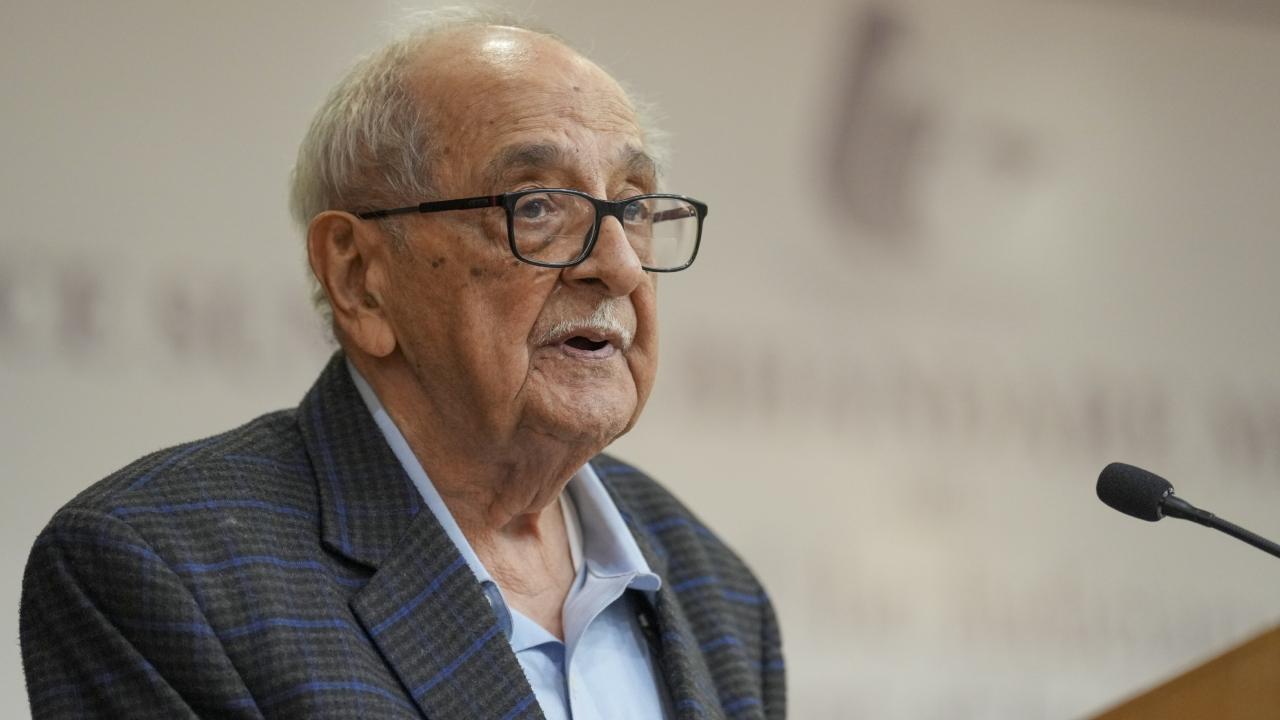Distinguished jurist and eminent lawyer Fali S Nariman, who breathed his last on Wednesday aged 95, was part of historic judicial proceedings

Fali S Nariman. File Pic/PTI
Distinguished jurist and eminent lawyer Fali S Nariman, who breathed his last on Wednesday aged 95, was part of historic judicial proceedings like in the Golaknath case and the Kesavananda Bharati case where the Supreme Court delivered path-breaking judgements that protected the rights of citizens and prevented Indian democracy from going adrift.
Nariman joined the Bombay Bar as a lawyer in November 1950, the year the Supreme Court also came into being.
A doyen of the legal profession, Nariman was suffering from multiple ailments, including cardiac issues.
Following are some of the notable cases of which Nariman was part as a counsel or senior lawyer during his illustrious career spanning over seven decades:
*The Golaknath case of 1967: The Supreme Court held that Parliament cannot make a law which is capable of infringing the fundamental rights of citizens. Nariman appeared for an intervenor supporting the petitioners seeking preservation of fundamental rights.
*The Kesavananda Bharati case: Nariman assisted noted advocate Nanabhoy Palkhivala in the famous case that led to the path-breaking judgement which laid down the "basic structure doctrine" of the Constitution, clipping Parliament's power to amend the Constitution. The 1973 verdict simultaneously gave the judiciary the authority to review any constitutional amendment on grounds of violation of the basic structure of the Constitution.
*The TMA Pai Foundation case: The top court recognised the autonomy of private educational institutions under Article 19(1)(g) of the Constitution, and allowed them to operate without excessive governmental interference. Nariman was one of the leading lawyers in the case.
*The SP Gupta or First judges case of 1981: The Supreme Court held that the primacy of the CJI's recommendation in judicial appointment and transfer can be turned down on cogent grounds by the government.
However, the judicial discussions finally led to creation of the collegium system of appointment of judges to constitutional courts in 1993, when the top court came out with its judgement in the second judges case.
*The 1984 Bhopal gas tragedy case: Nariman appeared for the Union Carbide. But he was candid enough to admit later that it was a mistake. He was also instrumental in finalising a deal between the victims and the company outside court.
*The NJAC case of 2014: A constitution bench in 2015 struck down the National Judicial Appointment Commission which was tasked with the responsibility of making judicial appointments.
The top court considered the submissions of Nariman, appearing for the Supreme Court Advocates on Record Association, and quashed the NJAC on grounds that it violated the freedom of judiciary, a basic structure of the Constitution.
*Disproportionate assets case against J Jayalalithaa: The former Tamil Nadu CM hired Nariman in 2014 to represent her. The senior lawyer secured her bail.
*The Narmada Rehabilitation case: Nariman represented the Gujarat government in the case, but quit following news reports of attacks on Christians and burning of copies of the Bible.
*The Cauvery water dispute case: Nariman represented Karnataka, irrespective of regime changes in the state, in the Supreme Court in the vexed river water sharing dispute involving southern riparian states of Karnataka, Tamil Nadu and Kerala.
On September 30, 2016, the jurist had refused to argue the matter for Karnataka over his differences with the state government on non-compliance of the top court's order asking the state to release 6,000 cusecs of water from the Cauvery river to Tamil Nadu.
*The Nabam Rebia judgement of 2016: The SC ruled the governor of a state can act only on the aid and advice of the council of ministers and the chief minister. Nariman appeared for House whip Bamang Felix. He submitted a governor did not have the power to advance the assembly session as this could only be done on the aid and advice of the council of ministers.
*The COVID-19 case: Nariman represented the Parsi community in its dispute over the protocol and standard operating procedure for handling of dead bodies of Parsi Zoroastrian COVID-19 victims under which metallic nets were to be installed above 'Tower of Silence' so that birds did not feed on the corpses and carry the killer virus elsewhere.
This story has been sourced from a third party syndicated feed, agencies. Mid-day accepts no responsibility or liability for its dependability, trustworthiness, reliability and data of the text. Mid-day management/mid-day.com reserves the sole right to alter, delete or remove (without notice) the content in its absolute discretion for any reason whatsoever
 Subscribe today by clicking the link and stay updated with the latest news!" Click here!
Subscribe today by clicking the link and stay updated with the latest news!" Click here!








